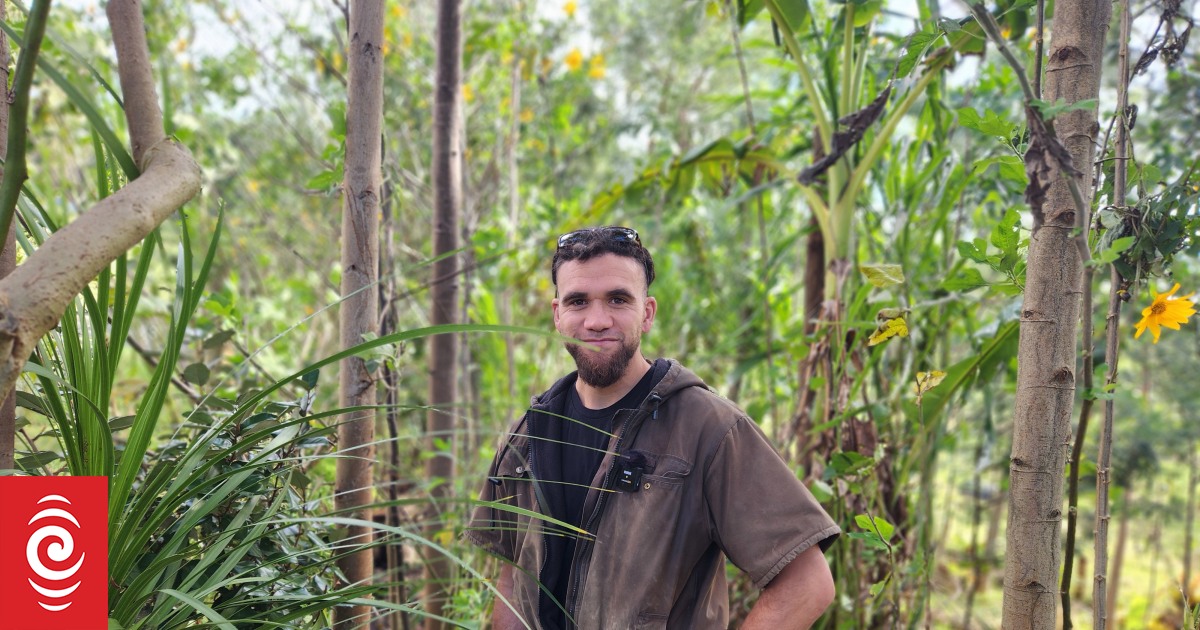
Jared Hiakita
Photo: RNZ/Sally Round
It’s hoped a fruit tree nursery taking shape in the Far North will help local people rely less heavily on supermarket shelves.
Jared Hiakita is co-founder of the charity ōNuku and is driving the venture on the north side of Hokianga Harbour, where he lives off grid in a “tiny house” with his young family.
The pandemic and extreme weather events have made people realise how quickly food might become scarce, he says, so his social enterprise wants to help more locals grow their own.
The plan is to nurture and donate fruit tree seedlings to marae and kura in the area and also sell the trees in order to fund the donations.

Jared Hiakita, through his social enterprise, ōNuku, is building a nursery to grow fruit trees for local marae and kura.
Photo: RNZ/Sally Round
Knowledge has been lost, according to Hiakita who also wants to help restore gardening skills.
“My uncles told me these amazing stories about their gardens that they had growing up, that my Nan and my Koro were responsible for, and that they would have to go and pitch in to maintain.
“By the time I was being told these stories, that’s all they were. They were just stories. It wasn’t real any more because like everyone else, they got caught in the wave of urban drift and kind of moved away from that way of life.”
He hopes the nursery will be operational by the end of the year with fruit trees being propagated from a 300 square metre shade house and potting shed, being built around the corner from the home he shares with partner and co-founder Rangimarie Mules.

Jared and Rangimarie live in an off-grid tiny house near Hokianga Harbour
Photo: RNZ/Sally Round
“Since COVID I’ve definitely noticed a huge rise in people’s interest and desire to learn how to grow food so that we can get through, you know, hardships.”
The nursery will become headquarters for not only propagation but education.
“It’ll become an orchard in itself and just a space of learning, a space where resources are created and disseminated out to the community.”
It’s not Hiakita’s first venture into humanitarian work. In 2019, the Muhammad Ali Centre in the United States picked him out as one of the world’s top change-makers for his work providing free education and resources to Maori.
As an activist for zero waste and affordable housing, he is living his principles and showed Country Life his solar-powered home surrounded by a flourishing food forest.

Even the kunekune piglet Dragon has a role to play in Jared’s food growing system
Photo: RNZ/Sally Round
On terraces below his home he practices a dense and varied food growing system known as syntropic agroforestry, learnt with the help of the Lotz family, previously featured on Country Life.
“There’s a mixture of fruiting trees, companion trees, medicinal trees. I would call it a mix between a garden, a traditional orchard and a forest in terms of how all the plants are interacting with each other, and how we’ve chosen to lay it out.”
“I didn’t have the privilege of growing up growing food and knowing what it was like to go and harvest food right from outside your doorstep.
“But now that we’re here on this whenua, that’s what we’re trying to create … a beautiful abundant food system that will provide for many generations ahead.”

Tamarillos are among the fruit growing in Jared’s food forest
Photo: RNZ/Sally Round




